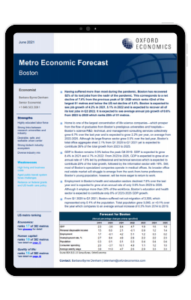US | Metro Economic Forecast: Boston

Having suffered more than most during the pandemic, Boston has recovered 52% of its lost jobs from the nadir of the pandemic. This corresponds to a net decline of 7.6% from the previous peak of Q1 2020 which ranks 42nd of the largest 51 metros and below the US net decline of 5.6%. Boston is expected to see job growth of 4.2% in 2021, 5.1% in 2022 and is expected to recover all of its lost jobs in Q3 2022. It is expected to see average annual job growth of 0.6% from 2023 to 2025 which ranks 28th of 51 metros.
What you will learn:
- Home to one of the largest concentration of life science companies—which prosper from the flow of graduates from Boston’s prestigious universities and hospitals—Boston’s science R&D, technical, and management consulting services collectively grew 6.7% over the last year and is expected to grow 2.2% per year, on average from 2022-2025.
- GDP in Boston remains 0.3% below the peak Q4 2019. GDP is expected to grow 8.4% in 2021 and 4.7% in 2022. From 2023 to 2025, GDP is expected to grow at an annual rate of 1.8% led by professional and technical services which is expected to contribute 20% of the total growth, followed by the information sector with 16%.
- Employment in Boston’s health and education sectors declined 7.8% over the last year and is expected to grow at an annual rate of only 0.6% from 2023 to 2025. Although it employs more than 20% of the workforce, Boston’s education and health sector is expected to contribute only 8% of 2023-2025 GDP growth.
Tags:
Related Services

Post
Industry Key Themes 2025: Industrial landscape at a critical juncture
Following prolonged weakness in 2022 and 2023, industrial growth is now regaining momentum.
Find Out More
Post
Czech Republic: Near-term recovery, long-term struggle
We believe the Czech Republic will move to the upper one-third of the fastest-growing EU economies in 2025-2026 after lagging its EU peers in the last four years. However, much of this will be catch-up growth, mainly in consumer spending, where a large shortfall remains. Relative to pre-pandemic, the economy will remain in bottom one-third of the EU, behind its CEE peers.
Find Out More